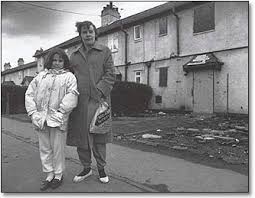Britain lacks 'fairness' 
Britain may be one of the world's richest countries but it ranks poorly on fairness, according to an influential German thinktank.
The Bertelsmann Foundation in Berlin calculated "social justice" in 31 of the world's wealthiest nations using the latest data from the Organisation for Economic Co-operation and Development (OECD) and placed Britain 15th – far below northern European countries which are in "a league of their own" when it comes to creating a fair and equitable society. The results are heavily weighted in favour of states that have cut destitution rates, kept employment high and have an egalitarian education system.
Britain falls short because of its child poverty rate, which is just above that of Greece, only spending 0.28% of national income on early childhood education, and an unemployment rate of 19% among young people.
Aart de Geus, a former Dutch welfare minister who sits on the foundation's board, said this combination of poverty, educational immobility and the effects of the recession meant Britain ranked low on the scale.
"About one in nine Britons now lives below the poverty line, educational opportunities for children depend considerably on their social background, and the recent increase in unemployment means too many young people have poor prospects in the labour market," said De Geus.
Britain was also singled out for a "particularly high level of earnings inequality". The report said "despite political efforts to combat inequality, the trend has actually worsened from the mid-1990s to the present ... such a tendency toward polarization is worrisome. Only Chile, Mexico, Turkey, the US and Portugal show greater disparities in the distribution of income."
One of the greatest challenges for the government, said the study, was how to make substantial strides toward greater social justice without burdening future generations with the costs of the economic crisis. The analysis showed that British national debt now amounts to nearly 90% of GDP, placing the country 22nd in the league table of national borrowing.
But the debt to GDP ratio was not seen as an insurmoutable obstacle to creating a fair society. Iceland tops the fairness league despite having massive national debt. Norway, Denmark, Sweden and Finland came next. The US was 27th and Turkey last.
France and Germany fared better than Britain although all three were outside the top five "fairest" rich nations.
Daniel Schraad-Tischler, the report's author, said bigger nations often had "much more complicated societies, bigger populations and faced much greater problems"."The fact that Iceland leads by far on the point of minimizing the effects of socioeconomic background on learning performance is perhaps unsurprising given its population, which is small in number and notably homogenous in comparison to other OECD states," he said.
Randeep Ramesh,
guardian.co.ukEmail ThisBlogThis!Share to TwitterShare to Facebook 0 comments 
 Links to this post British poor face freefall
Links to this post British poor face freefall 
The 25th anniversary of the City's Big Bang was marked by an extraordinarily apt set of events this week. A wealth of ironies tumbled out one after another as if scripted by some celestial playwright.
Begin with the latest earnings figures for FTSE 100 directors, up an astounding 49%. Bank shares soared on Thursday with typical irrational exuberance, pretending the eurozone refinancing means everything is back to normal. Expect some shocking figures next week for the drop in the percentage of tax on profits paid by tax-avoiding UK companies, a telling background to UK Uncut's pursuit of Goldman Sachs in the courts for its missing £10m tax.
Meanwhile, Incomes Data Services reports median wages rising by 2.4%, with an average of 0.0% in the public sector (many suffered cuts, so had less than zero), while inflation topped 5%. The Agricultural Wages Board was abolished in parliament on Tuesday, bringing some of the 152,000 farm and forestry workers to Westminster to lobby in vain against a potential £9m pay cut; it also removes the £3.05 hourly minimum for child farm workers.
The TUC's evidence this week to the Low Pay Commission, which sets the national minimum wage, called for raising the minimum above inflation, as it has fallen behind: no chance. Instead, a leaked government report suggested cutting employment rights, making it easier to fire people. Channel 4's FactCheck made mincemeat of that: the OECD reports the UK has the third least-regulated labour market. But europhobe rebels needed the myth that employers are handcuffed by EU red tape.
This week the Office for National Statistics reported the lowest participation in pension schemes since 1956. The steep drop in household incomes means people are abandoning pensions, ensuring poverty in old age and heavy costs to the state. Imposing another 3% on public sector employees will accelerate that exodus.
As the chill of George Osborne's austerity grips, a GfK NOP poll this week found an unsurprising collapse in consumer confidence. A dismal -32 confidence level suggests imminent double-dip, as it matches the plunges before the 1990 and 2008 recessions. Next week's GDP figures are expected to show no flicker on the life-support monitor.
As the income gap yawns wider, yet another report – this week from the Bertelsmann Foundation – ranks Britain just 15th in the OECD for social justice. Though one of the richest nations, UK child poverty is only just above Greece's. That's hardly news. But here's a small insight into hardship that Dr Eoin Clarke unearthed from the Centre for Retail Research. Shoplifting is rising, as it does in recessions. What are the most stolen items? Not luxuries. Cheese comes a long way top, meat second, then fish and baby milk only just behind alcohol. Baby milk!
I caught another snapshot of the nation when I chaired a rally in Central Hall Westminster. I wrongly expected a small event, but Choose Youth packed the hall on Tuesday with more than 1,000 young people lobbying MPs about the destruction of their services, in the week the IFS reported that education is being cut by 14%: Sure Start for toddlers, and 16- to 19-year-olds are hit hardest.
Anyone doubting 16-year-olds deserve the vote should have listened to speaker after speaker from sixth forms and colleges, young mayors, some high fliers, some with stories of rescue from personal disaster by youth schemes, some with music, from Salford, Bolton, Cumbria and Tottenham. They talked of losing the education maintenance allowance (EMA), the Connexions service, Aimhigher, the Future Jobs Fund, and, most shocking, the cutting of Care to Learn, the scheme providing childcare that until now allowed 90% of teenage mothers to stay in education.
Half of further education colleges report a drop in applications from 16- to 19-year-olds, mainly due to the loss of EMA, with no travel money. The Commons education committee has criticised the "disproportionate" cutting of youth services, condemning the replacement of year-round activities with a gimmicky six-week National Citizen Service for 16-year-olds, called "the gateway to the Big Society".
The cost of putting just half of 16-year-olds through the course is more than the entire budget for youth clubs and services before they were cut. One speaker noted that one year's worth of bankers' bonuses would pay for 23 years of the youth service. Barnado's research next week shows how successfully this government has turned popular opinion against the young. Votes at 16 might shift the political bias in cuts against youth.
On Thursday the government produced a welter of almost entirely misleading statistics on apprenticeships, in grave danger of tricking the 10% of young people now saying they may opt for apprenticeships instead of university. Already competition for the few prized places with such employers as BAE Systems is four times greater than for places at Cambridge.
Boasting in parliament of a 50% rise, David Cameron failed to admit the thousands of "new apprenticeships" at Morrisons and others are only rebranded adult training for existing, older employees, not new jobs for the young. They replace Labour's Train to Gain adult scheme but with fewer places. Other private providers call three-month, low-skill courses "apprenticeships", with no job at the end, while training companies make a killing from state funds: wait for the full scandal just breaking on this scam, as revealed in FE Week. The heartbreak is for the deceived "apprentices" getting near worthless qualifications.
This week at St Paul's, the Church of England agonised over God and mammon, with only the admirable Canon Giles Fraser willing to consider the lilies of the field with the protesters on the steps. Instead of seeking an eviction, the cathedral should be demanding the stock exchange lifts the injunction on its steps so the protesters can camp where they should be, at mammon's heart.
As the Occupy movement spreads to thousands of camps all over the world the City might think it was losing its status as a great financial centre if it didn't have one too. Go and listen to the lively debates held there with all manner of people, activists and distinguished economists, now giving a more spirited and thoughtful response than currently offered by the curiously bloodless Labour party.
If Labour fails to express more authentic outrage at what is happening surely other voices – remember the 1930s – will exploit popular indignation when the full blast of cuts and shrinking incomes hits home before long.
Polly Toynbee,
guardian.co. 




